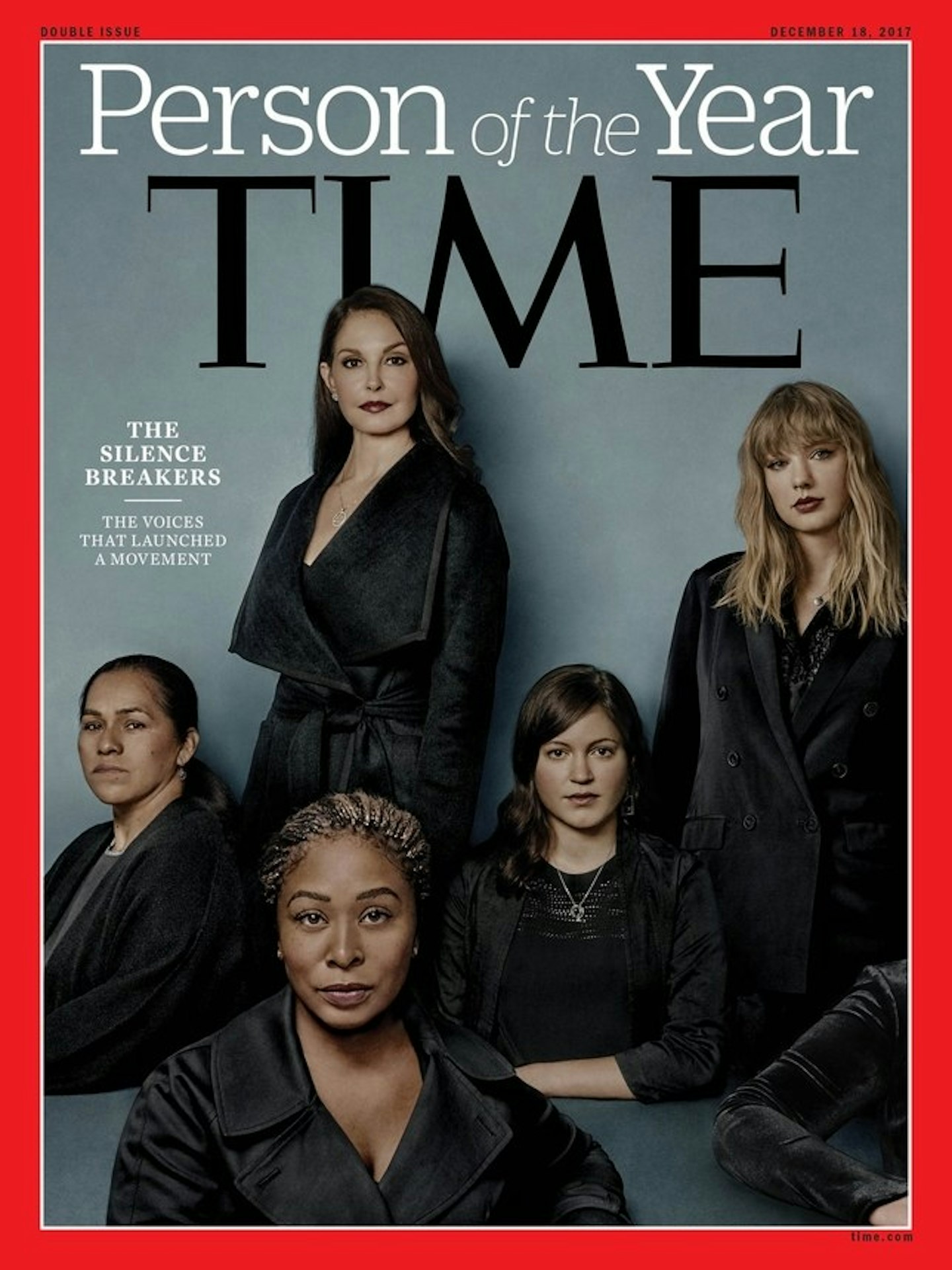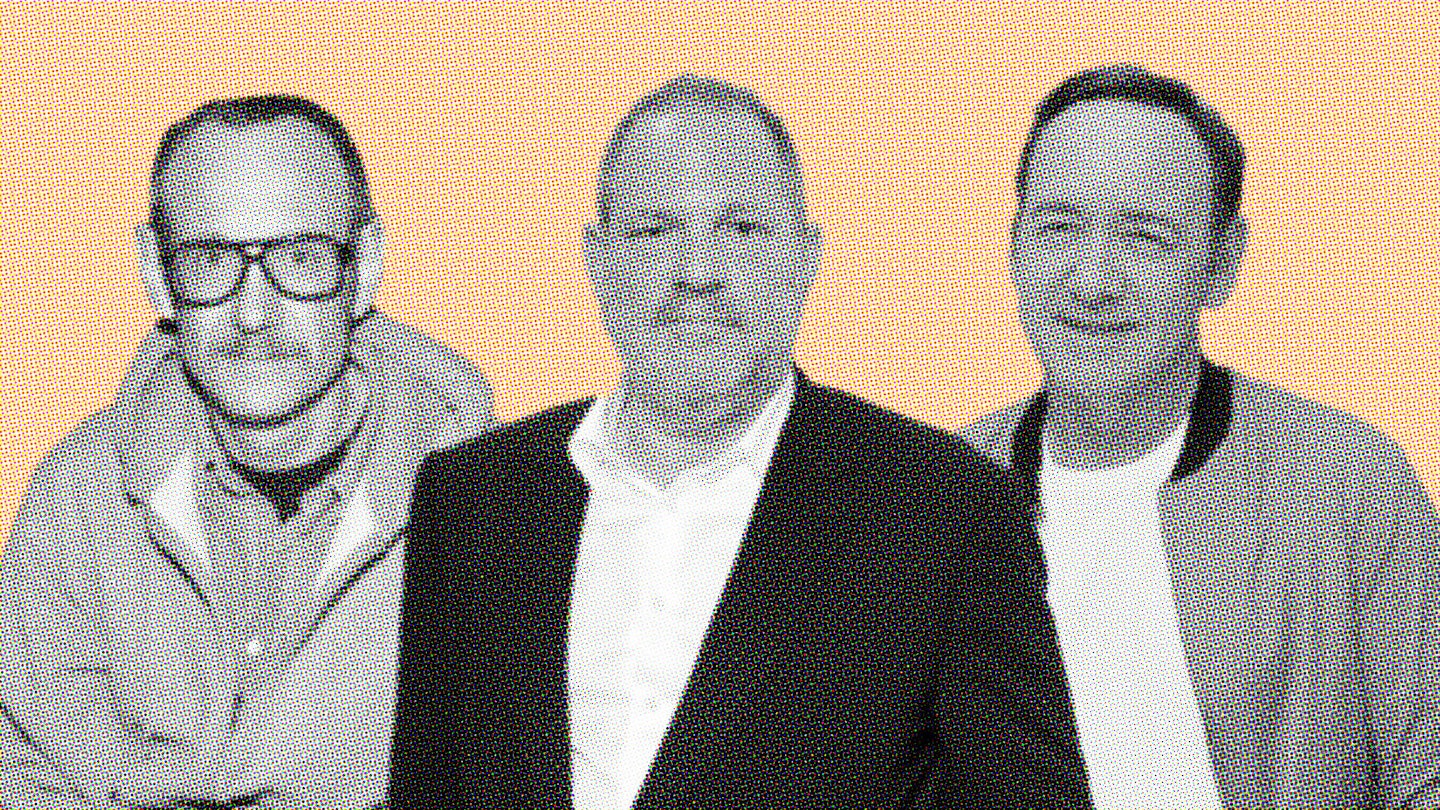If November 2016 is remembered as the moment that a man who had previously advocating ‘grabbing women by the pussy’ was democratically elected as President of the United States, November 2017 may well be written into the history books as the month in which the power structures which have enabled men who use that sort of language since time immemorial started to shift. Time Magazine’s Person of the Yearis not one individual but several who, they say, started the movement that got us here.
All wearing black and photographed against a neutral grey background the faces of five women stand out on the cover: Ashley Judd, Taylor Swift, Uber engineer Susan Fowler, lobbyist Adama Iwu and a Mexican strawberry picker whose name has been changed to Isabel Pascual in order to protect her identity. Tarana Burke, the woman who coined the term Me Too over a decade ago is featured inside the magazine where she is credited with starting a movement which, over time, has gathered momentum to the point where it feels, for the first time, that real change might be coming.

If you look closely at the cover, in the bottom right corner you can see that a sixth woman is notable by her absence. The crook of an elbow punctuates the line-up, cut off just before her neck and just above her wrist. This limb belongs to an anonymous hospital worker from Texas who reported sexual harassment and fears disclosing her identity would negatively impact her family.
That elbow could belong to so many women, those who have not felt they can come forward about the sexual aggression or harassment they have received, those who have and aren’t ready to talk. She is every woman who can’t speak out publicly and, despite the impact of Me Too, they must never be forgotten.
The reason that women all over the world cannot speak out about their experiences of sexual harassment, despite all that has happened this year, is that we do still live in a world where the men who abused them hold significant power. And, as Niccolo Machiavelli wrote in his Sixteenth Century treatise which advocates manipulation and cruelty as a way of gaining and maintain power, ‘it is much safer to be feared than loved’. Men who harass women know this.
The problem, which we must acknowledge, that these are traits we not only privilege but encourage in men. Recklessness, a disregard for rules, impulsivity and confidence are all characteristics that we associated with alpha CEO types which, perhaps, goes some way to explaining how we got here and offers us a way forward.
Dr Gregory Carter is a lecturer in psychology whose work has focussed on narcissism, Machiavellianism and psychopathy, also known as the Dark Triad. He tells me that it should come as no surprise that revelations about powerful people displaying sexually aggressive behaviour have come first from politics, media and CEOs (like Uber’s Travis Kalanick). ‘A psychologist called Kevin Dutton has written on psychopathy, compiling a list of the top ten jobs with the highest rates of psychology. CEO is top of the list but you also see at number three, individuals working in the media and politician is also on the list. These particular career paths seem to attract individuals who are highly psychopathic and narcissistic’.
The key names at the centre of our current conversations about sexual aggression and harassment are all men. Those accused include the likes of Harvey Weinstein to Terry Richardson, Ed Westwick, Kevin Spacey and Travis Kalanick - all men with considerable power. ‘Having a degree of control or power is something that appeals to those individuals with psychopathic or narcissistic tendencies’ Dr Carter explains ‘when you ask them what their top two motivations are you find its power and hedonism, seeking pleasure. When you combine this with a lack of empathy and concern for other people’s thoughts, feelings, rights and values you have a perfect storm where sexually aggressive or sexually abusive behaviour might emerge.’
Indeed, coupled with the act that those who display psychopathic or narcissistic traits tend to fill high powered jobs, social scientists and psychologists researching how power affects our behaviour in recent decades have also found that, on the other side of the coin, powerful people to develop ‘empathy deficits’, becoming less able to read other people’s emotions or take their way of seeing things on board. They have also been found to behave impulsively with little or no regard for the rules. This certainly sounds like a Weinstein. Indeed, studies also show that powerful men tend to overestimate the sexual interest of others and, as a result, mistakenly think that the women in their immediate vicinity are more attracted to them than they are in reality.
This year, an impeccably timed study, added to what we already know about the links between sexually aggressive behaviour and power. ‘Sexual Aggression When Power Is New: Effects of Acute High Power on Chronically Low-Power Individuals’, was published in the Journal of Personality and Social Psychology by a team from Stanford’s business school.
The authors, Melissa Williams, Deborah Gruenfeld and Lucia Gillory countered previous research that sexually aggressive behaviour is simply an expression of power. ‘We hypothesize’ they wrote ‘that power can indeed create opportunities for sexual aggression’ but ‘it is those who chronically experience low power who will choose to exploit such opportunities’. They found that ‘low-power men’, when placed in 'a high-power role, showed the most hostility in response to a denied opportunity with an attractive woman’ and, more than this, that ‘having power over an attractive woman increased harassment behaviour among men with chronic low, but not high, power’. What this means, in a nutshell, they said is that people who, for whatever reason, see themselves as having been denied power appear to have a greater desire to feel powerful and, as a result, are more likely to use sexual aggression as a means of feeling powerful or gaining power.
Those asking what happens now after Me Too, Harvey Weinstein or the Westminster Sexual Harassment spreadsheet should consider all of this. Women the world over will continue to do their work, and it is work, by forcing conversations about sexual harassment but until we turn our attention to the social systems and institutions which have enabled the perpetrators we aren’t going anywhere fast.
Sexually aggressive behaviour might be sexual but it is never about sex and always about power, both its presence and its absence. At the moment, pervasive myths like ‘women aren’t cut out to be CEOs’, ‘he might shout and scream but he’s an amazing leader’, ‘he only flirts to let off steam because his job is so high power’ are still banded around and used to justify sexual aggression as a necessary by-product of power and success. Perhaps it’s time to redefine what a CEO or industry looks like and, in doing so, elevate those who will use their power for good beyond massaging their own ego or plugging an internal power deficit to the top of our structures.
**You might also be interested in: ** The Dark Triad: The Scientific Reason Why We're All Attracted To Fuckboys Why Do Good Women Stay With Bad Men? Sexual Harassment At Work Has Shaped My Life
This article originally appeared on The Debrief.
